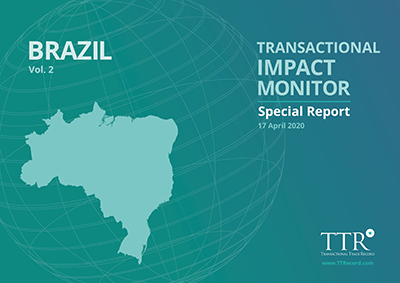Transactional Impact Monitor: Brazil – Vol. 2
17 April 2020
TTR’s Transactional Impact Monitor (TIM) is a Special Report combining local knowledge and market visibility from top dealmakers developed to address extraordinary situations affecting the macroeconomic stability and M&A outlook in core markets
INDEX
– M&A Outlook
– Private Equity
– Equity Capital Markets
– Handling the Crisis
– Dealmaker Profiles

Latin America’s largest economy has had its share of uncertainty over the past decade, but no previous crisis brought everyday life to such a standstill. Nonetheless, routine fits and starts and two major recessions in the past 10 years tempered the euphoria dealmakers were feeling in early 2020.
“Things in Brazil tend to be rather volatile,” said Veirano Advogados Partner Carlos Lobo. “You begin each year without really knowing where things are going to go.”
Notwithstanding the characteristic Brazilian nonchalance, spirits were high as prospects looked exceptionally good in early 2020, Lobo said, especially compared to the chaotic start last year that followed the inauguration of President Jair Bolsonaro, which suppressed M&A and capital markets activity in 1H19.

The beginning of 2020 was the opposite, Lobo said. Critical reforms were being pushed through, there was an expectation that Brazil’s GDP would grow by 2%, unemployment was falling and interest rates were low, so there was a positive outlook.
“We were all very optimistic this year in terms of M&A, private equity and equity capital markets,” agreed Reinaldo Grasson, Head of M&A and Debt Advisory at Deloitte in São Paulo. “Companies were delivering good results, they had strong balance sheets, the stock exchange was at an all time high. From all angles it was very, very positive.”
Market conditions in Brazil soured by mid-March however, as the threat of a pandemic prompted state and federal governments to respond by restricting travel outside the home and limiting non-essential business activities.

March was not bad, all things considered, Grasson said. “Not as good as the previous year, but we didn’t expect this setback.” The transactions being announced now are those that have already been through due diligence, he said. “Our clients, investors are waiting so see what’s going on in the country.”

By mid-April, the federal government had disbursed over BRL 3bn in BRL 600 payments to nearly 5m Brazilians in emergency income support, out of nearly 36m applications received by state bank Caixa Econômica Federal, according to the local press. The support to the country’s most vulnerable population has been matched by a loosening of fiscal targets and labor laws, an extension of tax filing and payment deadlines and specific support to airlines and the tourism industry, among a host of other measures.
State entities aren’t themselves immune from the downturn facing the country. This reality is most notable in the oil and gas sector, which is reeling from a global price war in addition to depressed demand for refined products. State-owned oil producer Petrobras announced on 15 April it would freeze operations on nearly 50 drilling platforms with some 2,600 direct and another 7,000 indirect jobs at stake. Deal volume in the oil and gas industry is sure to decline precipitously in 2020.

The falling M&A and Equity Capital Markets (ECM) workload is being replaced by matters that have become more pressing for clients at leading M&A law firm Cescon Barrieu, Founding Partner Marcos Flesch said. Litigation consultations, for example, have increased notably, Flesch said, though actual litigation hasn’t picked up yet. Clients are allowing the dust to settle and negotiating amicably with their suppliers and customers in the interim, he said. Cescon Barrieu is also seeing an uptick in consultations related to material adverse change and force majeure issues, Flesch noted.
All areas of Cescon Barrieu are actually working more than what was expected at the beginning of the crisis, noted Managing Partner Joaquim Oliveira. “We were a little bit surprised by the level of activity that we’ve had in the last four weeks.” The firm is bracing for a downturn in the next few months though, Oliveira said, but confidence in a return to normality by late May or June runs high.
M&A Outlook
… Click here to access the second issue of Transactional Impact Monitor: Brazil – Vol. 2.

